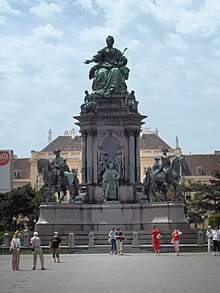Johann Cingroš
Johann Cingroš (born July 17, 1841 in Pilsen-Bolevec , † March 15, 1906 in Milan ), Czech Jan Cingroš , was an important kuk court and civil stonemason master in Pilsen , Bohemia , in Austria-Hungary . Johann Cingroš is considered to be the founder of the Austro-Hungarian syenite , granite and porphyry industries. When he founded his company, his main focus was on processing the material. At the end of the 19th century he had made his company one of the largest of its kind in Europe.
biography
He was born on July 17, 1841 in Bolevec (now part of Pilsen ).
In 1866, through his company, he founded the first syenite, granite and porphyry works, combined with stone cutting and sawmills in Bohemia, possibly all over Austria. He consolidated his company by acquiring numerous quarries of various types of stone at home and abroad. In a short time, this meant that he was able to take on orders for the most important monumental and construction works of the time and even met the highest demands on his performance to the satisfaction of the client.
As a result of the growing reputation of his company, the sales area soon expanded abroad, although similar and larger companies already existed there. The company supplied decorative and polished work for many of the largest monumental buildings in Germany and abroad, for example for the Maria Theresa Monument in Vienna, the Victory Monument in Darmstadt , the work on the Equitable Building in Vienna and Madrid, as well as buildings in New York , Budapest and many others.
Cingroš has received several awards for the quality of the work and the success. In 1885, Emperor Franz Joseph I visited the factory and expressed his satisfaction. By court decree of October 23, 1885, the emperor awarded the head of the Johann Cingroš company the title of kuk court stonemason master. Elsewhere, too, Johann Cingroš's achievements were recognized, his products were awarded prizes at the exhibitions in Eger 1881, Trieste 1882, Budweis 1884, Prague 1891, Sofia 1892 and Chicago 1893.
At the end of the 19th century, the company and the sales area continued to grow at home and abroad. A branch was opened in Olomouc , commercial agencies were also set up in Vienna and Budapest, and later in Odessa and London .
He died on March 15, 1906 in Milan while on sick leave and was buried in Pilsen. The company was taken over by his son Karel Cingroš and nephew Václav Cingroš.
There are three letters from Cingroš to a Viennese stonemason from 1908 and 1909 in the archive of Bestattung Wien .
Individual evidence
- ↑ The Gross-Industrie Austria: Festgabe for the glorious fiftieth anniversary of the reign of His Majesty the Emperor Franz Josef I, offered by the industrialists of Austria in 1898 . Volume 2., Vienna 1898. Leopold Weiss publisher. P. 41
- ↑ a b Catholic death register "Plzeň 103", page 54, entry Ø between 274 u. 275
- ↑ Catholic birth register "Plzeň 020", page 51
- ↑ Velkoprůmyslník p. Jan Cingroš †. Národní listy , March 20, 1906, p. 2
- ^ Archive Bestattung Wien
| personal data | |
|---|---|
| SURNAME | Cingroš, Johann |
| ALTERNATIVE NAMES | Cingroš, Jan |
| BRIEF DESCRIPTION | Bohemian master stonemason |
| DATE OF BIRTH | July 17, 1841 |
| PLACE OF BIRTH | Pilsen-Bolevec |
| DATE OF DEATH | March 15, 1906 |
| Place of death | Milan |


